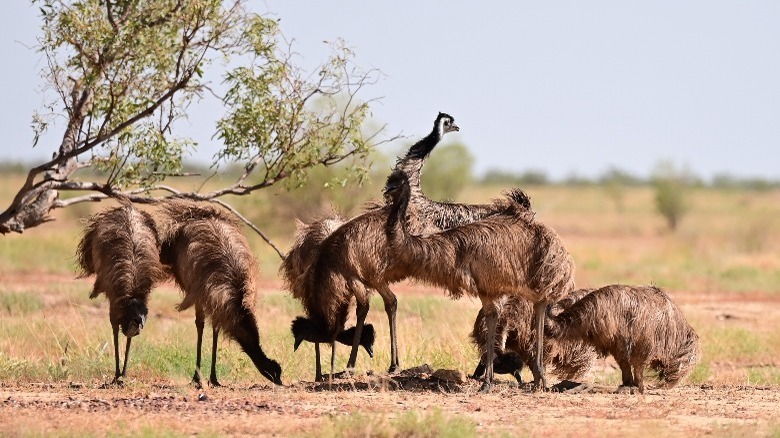Calling Emu Oil A Skincare Secret Isn't Just Inaccurate, It's Dismissive
We may receive a commission on purchases made from links.
Let's face it, the beauty industry has an ugly habit of appropriating traditional, cultural, usually Eastern or Indigenous practices, and repackaging them as a novel ingredient or new trend. But this appropriation becomes even more sensitive when animals are involved, and one skincare ingredient gaining traction in the beauty space is fraught with ethical dilemmas.
Emu oil is not a euphemism for anything other than what it is: oil derived and then processed from an emu. Similar to sheep's wool, emu oil is rich in lanolin and other fats that are coveted for their hydrating properties. Squalane, made from squalene, is another skincare ingredient derived from sharks that is rich in fat, but entails their slaughter.
Emu oil does not arrive on drugstore shelves without slaughter, either; the emu must be killed to extract the fats from its back. And emu meat is not often harvested as food, meaning that emus are being killed for cosmetic purposes. However, emu oil also has an intrinsic connection to the Australian Aboriginal peoples, where it has been used for various healing and protection purposes. Touting emu oil as a skincare "secret" denies that it has long been used by Aboriginal peoples, where the first settled in Australia between 40,000 and 30,000 years ago, per the Scholarly Community Encyclopedia. But even more than that, it separates emu oil from its context within this Indigenous culture — which could have its consequences.
The context of emu oil
Within the context of the Australian Aboriginal peoples, the use of emu oil is different to the average consumer's use of emu oil as a cosmetic product. Where many Indigenous groups largely rely on traditional knowledge of plants and animals and their usages for survival, the average consumer probably does not need emu oil to the same extent. Acknowledging this context is critical when engaging with emu oil, where, without it, emu oil becomes flattened as just another commodity. TikTok creator Zanele, aka @a.mji.thang, discusses her use of emu oil in a TikTok video. "I've been slightly hesitant to tell people to run out and go buy emu oil en masse because obviously I don't want emus dying en masse," she says.
Emus are at present a stable bird population. One emu will produce between four to 5 liters of oil, according to a document from the Texas A&M University System. Zanele continues that emu oil can be expensive — a four ounce bottle found on Amazon costs almost $30 — and that not much is needed to use the oil, which means it should be able to last. She uses the hashtag #naturalremedies in her video, where many skincare aficionados opt for natural solutions to their skin concerns instead of using products formulated with synthetic ingredients.
Issues with emu oil
However, it is crucial to remember that just because a product is "natural" does not, by default, make it safe. When TikTok creator and dermatologist Dr. Jarische Lao-Ang describes the benefits of Emu oil in her TikTok video, she also notes that the oil she uses is certified by the Therapeutic Goods Administration of Australia, or TGA. Emu oil is not FDA-approved, though the American Emu Association does offer certification for grading emu oil to the highest standards. Emu oil must be 100% pure to avoid putting potential toxins or irritants on your skin, according to experts speaking with the South China Morning Post. And even then, research from Inflammopharmacology shows that the potency of emu oil present in various products on the market is not consistent, so consumers who want to try it must be thorough in gleaning how much of the product they are actually getting.
While anecdotal evidence and Indigenous knowledge points to the benefits of emu oil on the skin, research on the efficacy of emu oil is still being conducted. Like many ingredients lifted from old cultural or traditional practices, emu oil can be subject to overblown claims of its properties. Alternatives to emu oil are also plentiful, including one plant-blend oil, GREEMU, formulated as a highly specific, vegan alternative to emu oil. While the ways in which we engage in skincare is ultimately a personal choice, ensuring that your choices are rooted in cultural context is critical.

